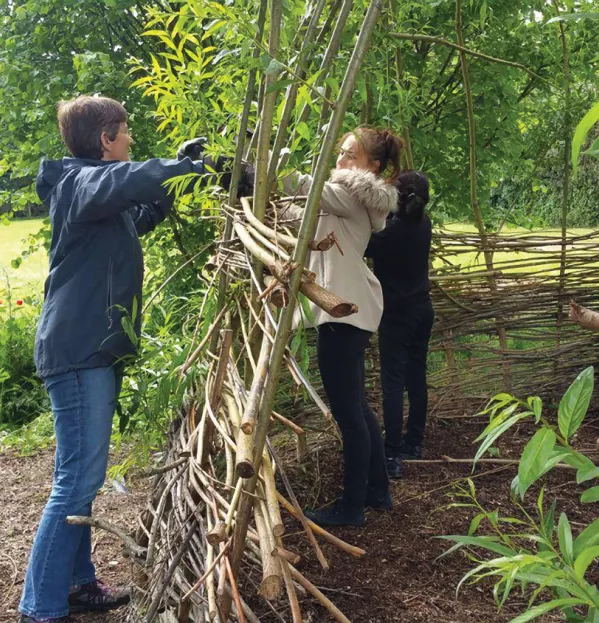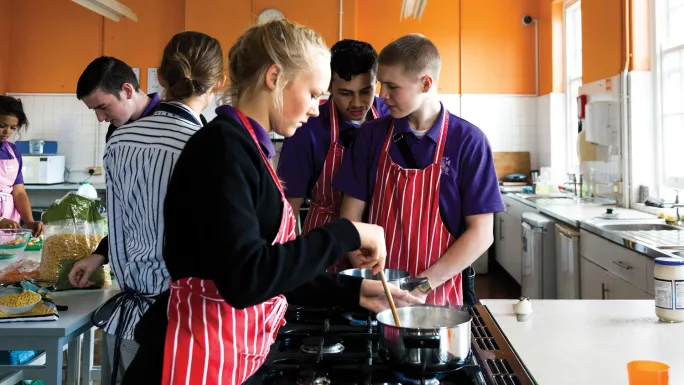‘Our pupils need a different approach to help them learn’

Today’s lunch is chicken and potato curry with rice and, from the way it’s disappearing, it’s obviously a hit. Today’s chef is Charlie.
Charlie, like her fellow key stage 4 students, is too busy eating to have much time for chatting. How often does she cook? “Once a week.” Does she enjoy it? “It’s all right.” And by then, her plate is empty and she’s off.
But while she may not want to dwell on it just now, cooking for her classmates is teaching her some valuable skills, according to family outreach worker Jackie Lawrence.
“They are cooking from scratch and a lot of them don’t have any cooking skills, but it is also about teamwork and social skills,” she says.
This emphasis on the whole person, and on the skills that students will need when they leave education, is at the heart of the approach at The Limes College, which this year was named alternative provision school of the year in the TES Schools Awards.
Students also learn about taking responsibility and serving others through cooking, explains headteacher Emma Bradshaw.
“The aim is that they will go on to cook for themselves and their families,” she says. “And that they won’t be eating ready meals - they will be eating proper food that they have prepared themselves.”
Major differences
The Limes College is a pupil referral unit (PRU) in the outer London borough of Sutton. It has 120 pupils on roll, predominantly in key stages 3 and 4, although from September it has also been funded to take children from as young as 5.
In some ways, The Limes is like any other school. Students wear uniform - unusual for a PRU - and have lessons in conventional-looking classrooms. But there are some major differences, aside from asking students to cook their own lunch.
One is the high staff-student ratio. With 21 teachers in a staff of 69, most classes have a maximum of eight students, and six in KS3. There are an additional 20 curriculum support staff working in the classroom and 15 professional support staff - ranging from family outreach workers to psychologists and social workers.

As well as a slimmed-down version of the curriculum, the school offers anger management sessions and play and art therapy. Parents are invited to a weekly family support group.
“What makes it work here is the range of intervention,” says Bradshaw, who notes that around 90 per cent of students are known to social care before they arrive at The Limes.
“Often they have social and emotional needs and unmet special needs, so they need a different approach to learning,” she explains.
Small classes and a high turnover of pupils also mean flexible teaching, Bradshaw adds. The teachers can tailor the curriculum to the needs of individual students.
Trust is vital. Big secondary schools haven’t got the intense relationships we have here
The school also places a heavy emphasis on outdoor education. KS3 students spend every Friday doing activities outside the classroom and there are regular camps.
Bradshaw has just returned from a week with a group of students on a 70ft sailing boat.
“That is massively powerful,” she says. “They are living in a very small space and it is an intense environment. Sometimes a lot of the learning is about dealing with difficult situations and the stress, because they have got to learn to get on.”
Staff at The Limes see helping students to resolve conflict as critical, and they spend a lot of time building relationships and establishing a rapport.
“Trust is vital,” says Bradshaw. “In a big secondary school, you haven’t got the intense relationships we have here.
“In a secondary school, you get teachers who are there to teach and they’re passionate about their subject. Everybody who works here is passionate about helping young people have a second chance.”
Return to mainstream
Most schools are keen to keep hold of their students, but at The Limes the opposite is the case. In fact, the school counts it as a success if students leave - and many do return to mainstream education.
The exception is those who arrive in Year 10, where the priority is to help them get good GCSEs or vocational qualifications, and then into high-quality further education or training, says business manager and former teacher Nigel Bennett. Some go on to take A levels and attend university.
A lot of the learning is about dealing with difficult situations
Students’ time at The Limes can be one of the few bright spots in a generally negative experience of education, Bennett says, although even the staff can still get taken by surprise. He tells a story of locking up one autumn evening when he was confronted at the gate by a hooded youth, who asked if he was the only one there.
“He reached into his bag,” Bennett recalls. “I thought, ‘What on earth is he going to get?’ He took out his plumbing certificate. He just wanted to show someone what he had achieved. You wouldn’t think they would want to come back here, but they do.”
Register with Tes and you can read two free articles every month plus you'll have access to our range of award-winning newsletters.
Keep reading with our special offer!
You’ve reached your limit of free articles this month.
- Unlimited access to all Tes magazine content
- Save your favourite articles and gift them to your colleagues
- Exclusive subscriber-only stories
- Over 200,000 archived articles
- Unlimited access to all Tes magazine content
- Save your favourite articles and gift them to your colleagues
- Exclusive subscriber-only stories
- Over 200,000 archived articles